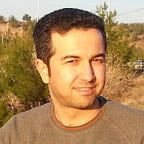The Families of the Zummar Eleven Will Wait as Long as They Have to for Their Loved Ones’ Return
Relatives of missing Kurdish fighters camp out, demand answers, volunteer to fight
When Islamic State militants and Kurdish Peshmerga clashed near the town of Zummar Twon, the Kurds found themselves outgunned. The Pesh retreated. And in the confusion, 11 Peshmerga fighters got left behind.
Since Aug. 2, about 30 Kurds have been sitting in a tent they set up near a Peshmerega checkpoint at Sihela bridge on the Tigris River. They say they won’t leave until someone returns their loved ones to them, dead or alive.
None of the fighters’ relatives are overly optimistic about the soldiers’ fates.
Fifty-seven-year-old Harith Hassan said that they don’t know which of the 11 Peshmerga died during the battle, and which may have been captured or executed by the militants.
Hassan’s nephew is one of the left-behind Pesh. Survivors of the battle told him the 11 Peshmerga fought fiercely against the militants and killed many of the attackers as they made their last stand.
“According to my information, my nephew had been wounded and ISIS fighters reached him after that,” Hassan told me. He said he doesn’t know whether militants killed or captured his nephew.
“We ask Mr. President Barzani to bring those Peshmerga back to us, alive or dead,” Hassan said. “We will be very grateful if he did that for us. I only know my nephew and a few relatives out of those 11 Peshmerga, but they all are Peshmerga and we are one nation and we are fighting for the same goal.”
Islamic State has been launching attacks on mixed communities, areas where Kurds and Arabs have historically lived together. In some cases, local Arabs have helped the militants occupy these areas—and have even fought beside them against the Peshmerga.
Hassan said he would “never forgive” the Arabs who fought against their Kurdish neighbors.
He added that the Peshmerga have advanced closer to Zummar, liberating several villages along the way. The old man and the other kin are waiting for Kurdish forces to get to the area where the 11 Peshmerga were last seen.
Around 50 men from Hassan’s family have volunteered to go to fight with the Peshmerga.
When I was driving to Sihela to interview with the families, I was told that some of the volunteer Peshmerga had just left. I was able to reach them after driving five kilometers.
Mullah Rajab Mohammad, a 29-year-old clergymen, was one of the volunteers. He was wearing traditional Kurdish clothes and the clergy’s customary hat. He carried a Kalashnikov rifle.
Mohammad said that they’re trying to get the bodies back, as well as trying to help the Peshmerga in their ongoing fight. They were bringing food to the main Pesh force when we spoke.
Mohammad said he feels little kinship with the militants who claim to be fighting for their own faith.
“ISIS’s understanding to Islam is totally wrong,” Mohammad said. “Islam is so far away from their works. In the history of Islam not the Prophet nor his friends did what ISIS is doing.”
The clergyman said that he sees defending Kurdistan as both a religious and a national duty. “ISIS is the enemy for Kurds and their aim is to prevent Kurds from reaching their dreams.”
Jawhar Hassan, 27, told me he was hoping that they could recover the bodies of of his relatives within two days.
But I made another visit to the area after one week, and the people were still waiting. The Peshmerga were getting bogged down, unable to move farther as Islamic State had rigged Zummar with explosives and booby-traps—a favorite tactic of the militants.
So the fates of the left-behind Pesh remain a mystery. And their families continue to wait, hope and fear.
